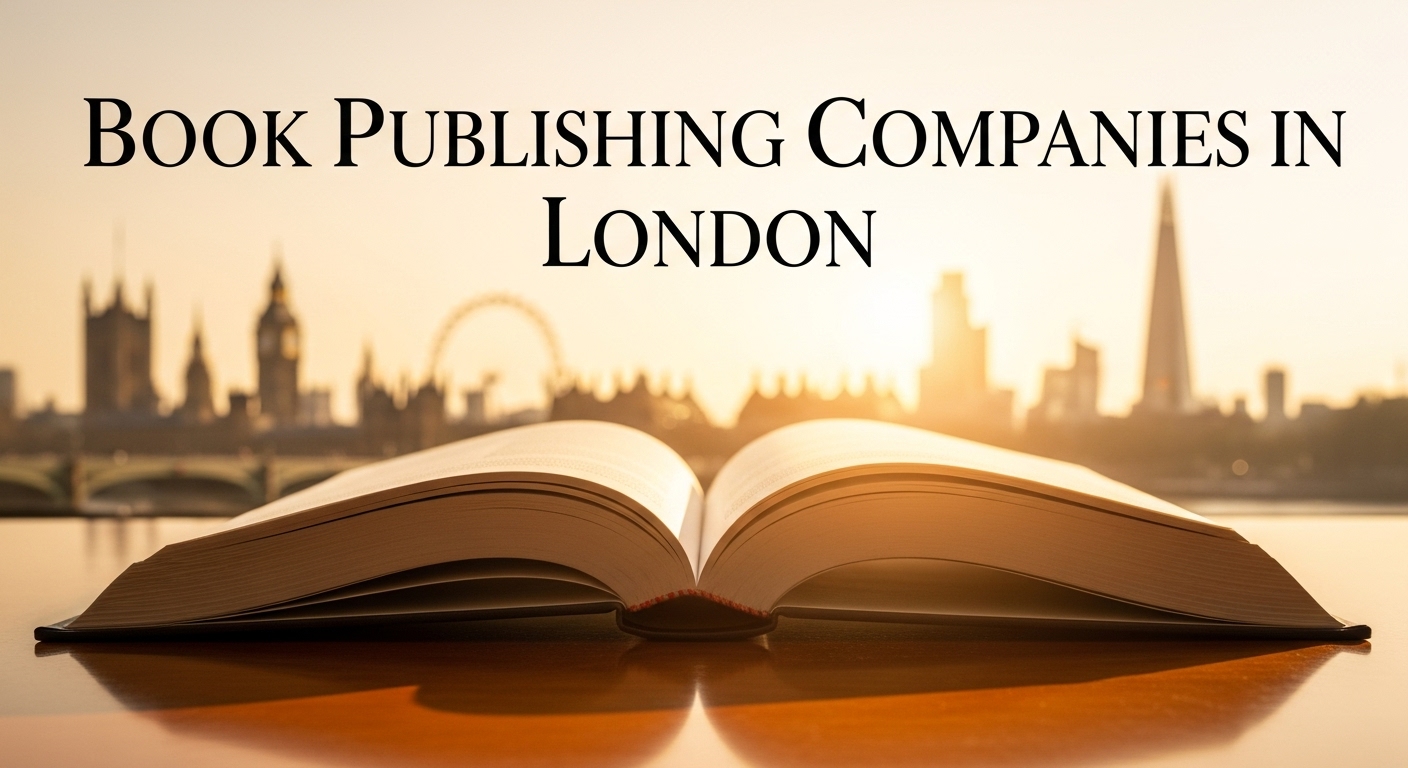
London has long been the epicenter of English-language publishing, blending centuries of literary tradition with cutting-edge creativity. In 2025, the city remains a global hub where established publishing giants coexist with innovative independents, offering opportunities for authors across every genre. From fiction and non-fiction to academic and illustrated works, London’s publishers continue to shape trends, discover voices, and connect stories with readers worldwide.
1. Barnett Ghostwriting
Barnett Ghostwriting has emerged as a versatile name in London’s book industry, combining ghostwriting, editing, and publishing services under one roof. The company helps authors bring their stories to life through personalized writing partnerships and full publishing management. Unlike traditional houses, Barnett emphasizes author collaboration, helping both debut and professional writers shape compelling manuscripts ready for market.
Highlights:
- Focus: Ghostwriting, editing, and guided publishing.
- Strengths: Hands-on creative development and multi-genre expertise.
- Ideal for: Authors seeking professional writing support and custom publishing solutions.
2. Penguin Random House UK
As the UK’s largest publishing powerhouse, Penguin Random House maintains its central London headquarters as a hub for creativity and innovation. The company oversees dozens of imprints, publishing everything from literary classics to contemporary bestsellers. Their extensive global distribution network ensures authors reach readers across the world.
Highlights:
- Focus: Trade fiction, non-fiction, and children’s literature.
- Strengths: Global distribution, strong editorial teams, and diverse imprints.
- Ideal for: Established authors or agented writers seeking mainstream visibility.
3. Bloomsbury Publishing
Bloomsbury remains one of London’s most respected independent publishers, balancing literary integrity with commercial success. Known for its award-winning fiction and academic divisions, the company continues to influence the international publishing landscape. Its commitment to nurturing voices across genres—from fantasy to scholarly works—keeps it relevant in 2025.
Highlights:
- Focus: Literary fiction, children’s books, and academic publishing.
- Strengths: Rich editorial tradition and balanced trade-academic approach.
- Ideal for: Authors seeking credibility with a blend of creativity and scholarship.
4. Hachette UK
Hachette UK encompasses a family of prestigious imprints, including Orion, Hodder & Stoughton, and Little, Brown. With its main offices in London, Hachette operates as a major force in both the UK and global markets. Its editorial teams are known for identifying bestselling voices and supporting them with powerful marketing strategies.
Highlights:
- Focus: Commercial fiction, lifestyle, and narrative non-fiction.
- Strengths: Industry-leading marketing and robust retail partnerships.
- Ideal for: Authors seeking wide distribution and brand-building potential.
5. HarperCollins UK
With a strong global heritage, HarperCollins UK brings international influence to its London offices. The company publishes across genres, from gripping thrillers to thought-provoking non-fiction. Its collaborative approach between editors and authors has made it one of the most reliable names in modern publishing.
Highlights:
- Focus: Commercial and literary fiction, business, memoirs, and children’s titles.
- Strengths: Cross-media connections and strong editorial quality.
- Ideal for: Writers looking for international exposure and multimedia potential.
6. Pan Macmillan
Pan Macmillan continues to uphold its reputation for high-quality storytelling and creative publishing. Its various imprints—Picador, Macmillan, and Tor UK—cover a broad literary spectrum, making it one of the most inclusive publishing groups in London. The company’s dedication to nurturing authors over the long term distinguishes it in the modern market.
Highlights:
- Focus: Literary and commercial fiction, non-fiction, and genre fiction.
- Strengths: Deep editorial relationships and consistent marketing support.
- Ideal for: Authors who value creative collaboration and long-term growth.
7. Faber & Faber
Faber & Faber stands as a symbol of literary excellence. Based in London since 1929, the publisher has cultivated a legacy of literary innovation through poetry, drama, and fiction. Its editorial vision remains rooted in discovering unique voices that shape cultural conversation.
Highlights:
- Focus: Literary fiction, poetry, and creative non-fiction.
- Strengths: Editorial prestige, award-winning authors, and selective curation.
- Ideal for: Writers seeking literary recognition and cultural impact.
8. Hodder & Stoughton
Part of the Hachette group, Hodder & Stoughton is one of the UK’s oldest publishing houses, with a diverse catalogue that blends commercial appeal with storytelling depth. The imprint excels at producing bestsellers while maintaining editorial credibility.
Highlights:
- Focus: Commercial fiction, biographies, and narrative non-fiction.
- Strengths: Market reach and successful mainstream authors.
- Ideal for: Authors aiming for bestseller potential with strong editorial backing.
9. Quercus Publishing
Quercus is renowned for its carefully curated list that champions originality and quality. Known for crime, literary fiction, and translated works, the publisher thrives on variety and global collaboration. It is one of London’s most innovative mid-sized publishers.
Highlights:
- Focus: Crime, thriller, translated fiction, and literary titles.
- Strengths: Genre expertise and distinctive storytelling.
- Ideal for: Authors who value both literary quality and commercial appeal.
10. Profile Books
Profile Books remains an independent powerhouse focused primarily on narrative-driven non-fiction. Their titles span history, science, memoir, and politics, often characterized by intellectual depth and mainstream accessibility. The house is widely respected for championing originality.
Highlights:
- Focus: Serious and accessible non-fiction.
- Strengths: Editorial excellence and consistent backlist success.
- Ideal for: Non-fiction writers with thought-provoking ideas.
11. Icon Books
Based in London, Icon Books has carved a niche in publishing smart, accessible, and idea-led titles. Their books often interpret complex subjects for general audiences, blending readability with insight. It’s a go-to house for thought leaders and subject experts.
Highlights:
- Focus: Business, psychology, philosophy, and popular science.
- Strengths: Clarity, practicality, and author brand development.
- Ideal for: Professionals and academics seeking mass-market reach.
12. Canongate (London Office)
Although originally Scottish, Canongate has established a strong presence in London’s literary scene. Known for publishing bold and unconventional voices, the company’s approach to storytelling merges creativity with authenticity. Its London office supports its growing UK and international operations.
Highlights:
- Focus: Innovative fiction and creative non-fiction.
- Strengths: Risk-taking editorial approach and diverse catalogue.
- Ideal for: Authors with fresh, unconventional voices.
13. Thames & Hudson
Thames & Hudson is one of the world’s leading publishers of visual arts and illustrated books. From fine art and photography to fashion and architecture, its London base serves as a hub of design-driven publishing. Each title reflects impeccable aesthetic quality.
Highlights:
- Focus: Visual arts, design, photography, and cultural history.
- Strengths: High-quality production and international prestige.
- Ideal for: Artists, designers, and academics in creative fields.
14. Orion Publishing Group
Orion Publishing, another imprint under the Hachette umbrella, focuses on delivering mass-market appeal with editorial precision. Its list ranges from genre fiction to lifestyle and popular culture, making it one of London’s most commercially successful houses.
Highlights:
- Focus: General fiction, crime, fantasy, and pop culture.
- Strengths: Market adaptability and genre leadership.
- Ideal for: Authors targeting mainstream readership.
15. Independent & Boutique Presses
London’s literary ecosystem thrives on its small but mighty independent publishers. Names like Galley Beggar Press, Bluemoose Books, and Salt Publishing offer vital platforms for emerging writers. These presses often champion artistic innovation, debut fiction, and experimental forms that might not fit mainstream categories.
Highlights:
- Focus: Debut and literary fiction, experimental narratives.
- Strengths: Personal editorial relationships and creative freedom.
- Ideal for: New authors seeking authenticity and editorial intimacy.
How to Choose the Right Publisher
Selecting the right publisher depends on your book’s genre, audience, and creative goals. Here’s what to consider when approaching any London publisher:
- Genre Fit: Match your book’s theme to a publisher’s existing catalogue.
- Submission Process: Most major houses require an agent, while small presses accept direct submissions.
- Editorial Vision: Look for a team that understands your tone and audience.
- Distribution Reach: Larger publishers offer scale; smaller ones offer personal involvement.
- Contract Type: Review royalty terms, rights clauses, and marketing commitments carefully.
The Future of Publishing in London
The London publishing landscape in 2025 blends tradition with technology. Many publishers are embracing digital formats, AI-assisted editing, and multimedia storytelling. Independent presses continue to drive innovation, while established companies expand global readership through online marketing and audiobook platforms. Despite constant change, the city remains a cornerstone of creativity—proving that London’s literary heartbeat never fades.
Conclusion
From legacy giants like Penguin Random House and HarperCollins to independent voices like Barnett Ghostwriting and Profile Books, London’s publishing world in 2025 remains diverse, resilient, and forward-thinking. Each company on this list plays a vital role in shaping what readers discover next. Whether you dream of literary acclaim, commercial success, or personal expression, London offers the right publishing home for every kind of author.
FAQs
Q: How much does it cost to publish a book in London?
It depends—traditional publishing covers costs, while self-publishing or hybrid routes vary from $1,200 to $12,000 depending on services and production quality.
Q: Do London publishers accept unsolicited manuscripts?
Most major ones don’t; smaller independent presses often do.
Q: How can I make my book a bestseller?
Strong writing, a solid marketing strategy, and choosing the right publisher are key.
Q: Which genres are trending in 2025?
Speculative fiction, memoirs, and socially conscious non-fiction are gaining momentum.
Q: How long does publishing take?
Typically 9–18 months from acceptance to release, depending on editing and marketing schedules.





